人教版(2019)必修 第三册 Unit5 The Value of Money Reading and Thinking 课件(共38张PPT)
文档属性
| 名称 | 人教版(2019)必修 第三册 Unit5 The Value of Money Reading and Thinking 课件(共38张PPT) |  | |
| 格式 | pptx | ||
| 文件大小 | 16.0MB | ||
| 资源类型 | 教案 | ||
| 版本资源 | 人教版(2019) | ||
| 科目 | 英语 | ||
| 更新时间 | 2025-06-11 16:10:39 | ||
图片预览

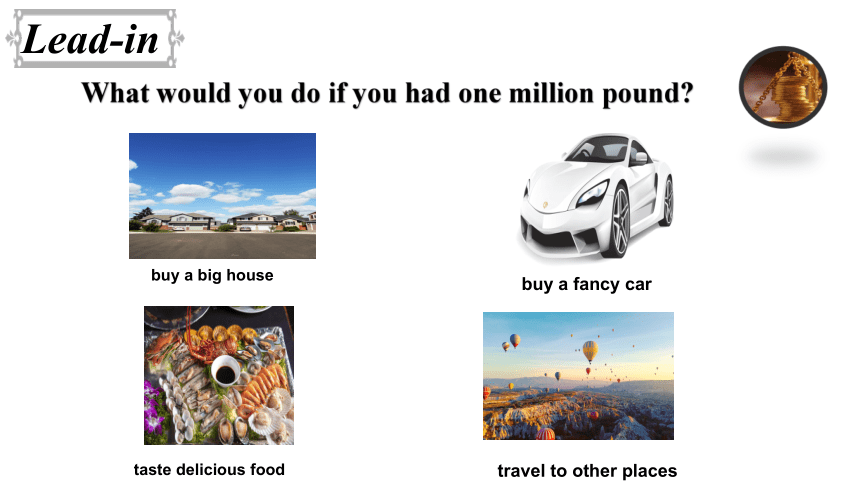
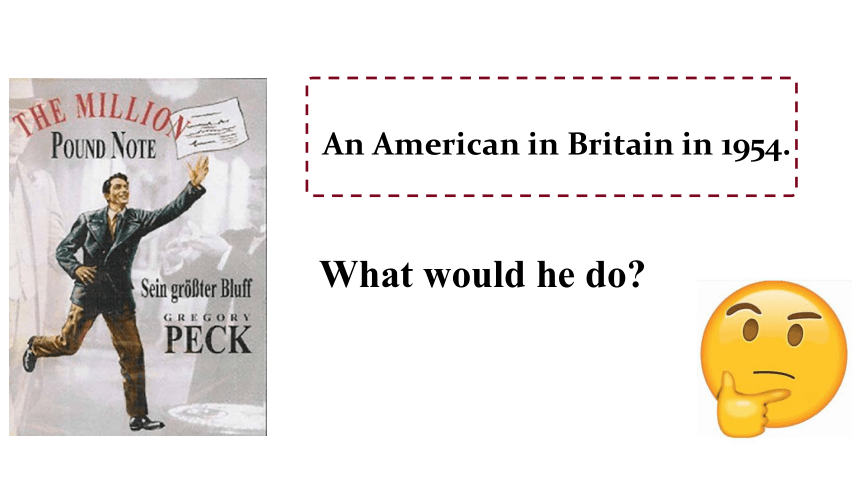

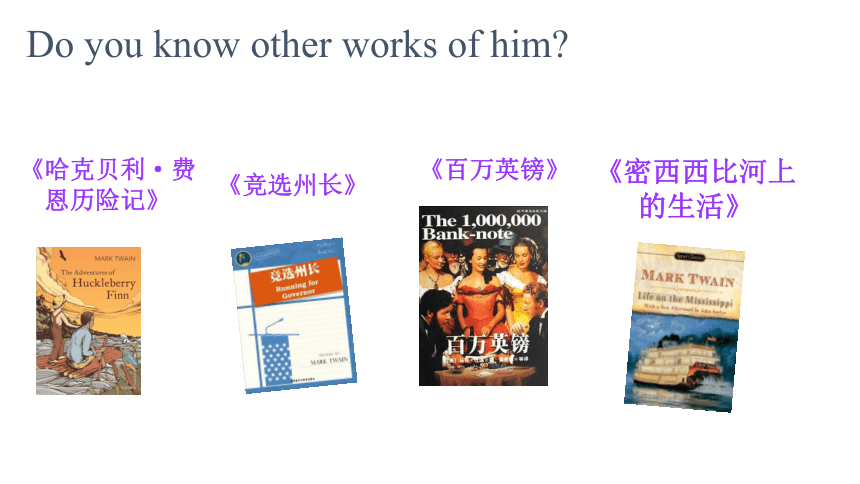

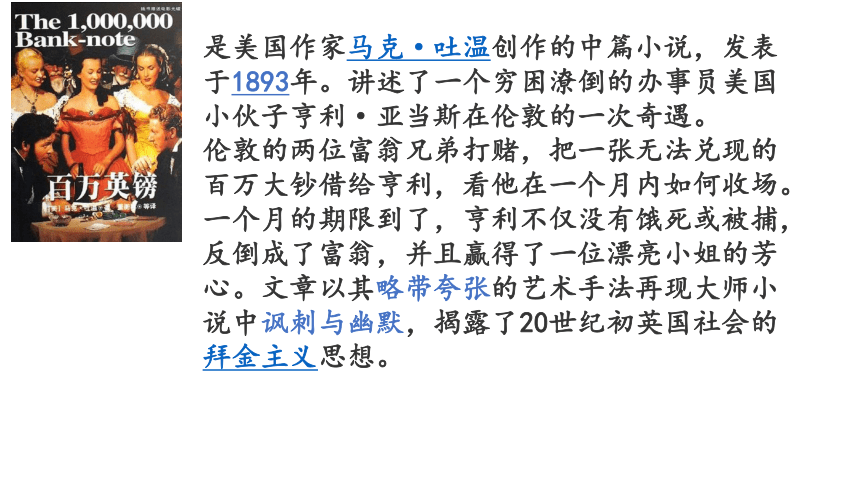

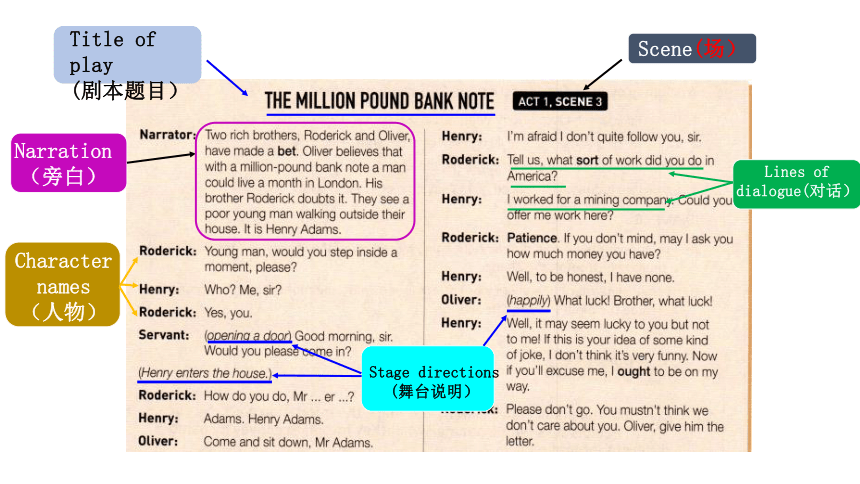
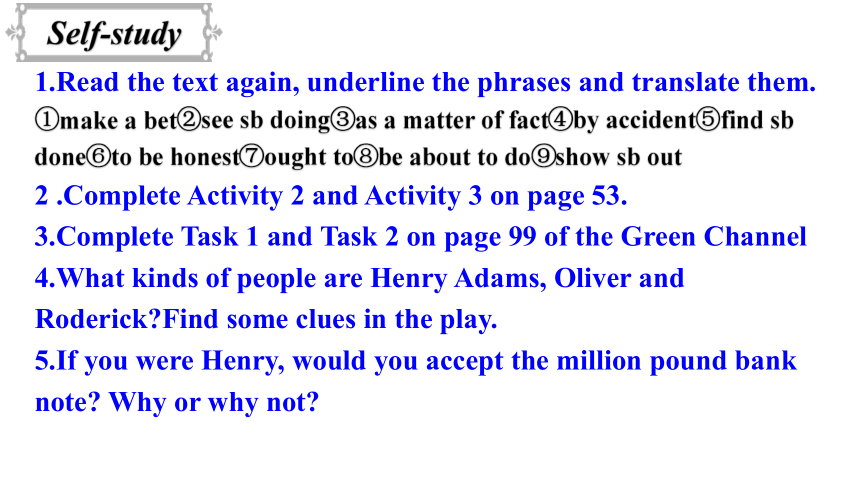
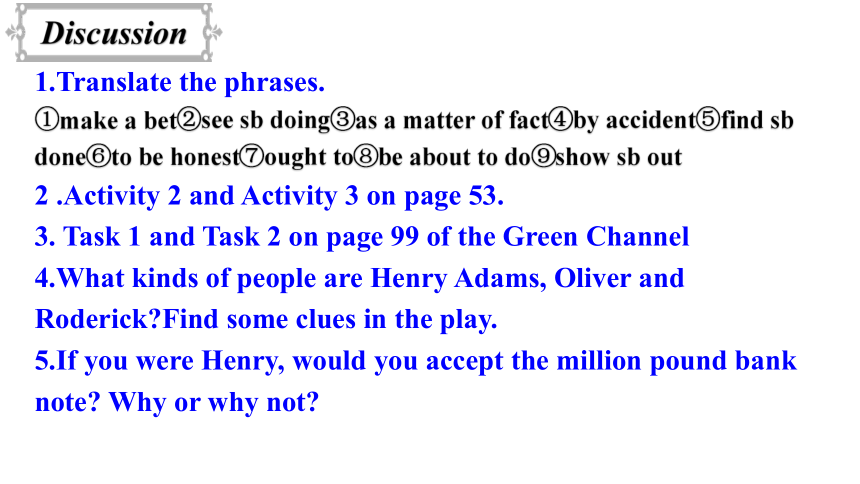
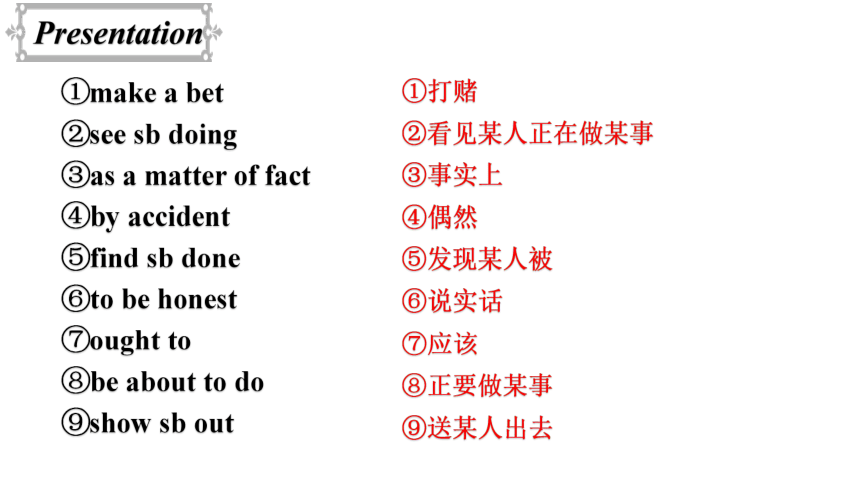
文档简介
(共38张PPT)
Unit 5 The Value of Money
Reading and Thinking
Lead-in
What would you do if you had one million pound
buy a big house
taste delicious food
buy a fancy car
travel to other places
An American in Britain in 1954.
What would he do
What do you know about Mark Twain
Mark Twain(1835—1910)
Samuel Langhorne Clemens
塞缪尔·兰霍恩·克莱门斯
American short story writer, novelist, humorist, literary giant
美国短篇小说作家、小说家、幽默作家、文学巨匠
Do you know other works of him
《密西西比河上的生活》
《哈克贝利·费恩历险记》
《竞选州长》
《百万英镑》
Early stage: Active & humor
Mid-term: Satire(讽刺)
Later period: pessimistic & desperate
He used a lot of colloquial idioms (俚语) and colloquial syntax (口语) and made his writing full of allegories (寓言) that lay behind the humor.
His writing style:
是美国作家马克·吐温创作的中篇小说,发表于1893年。讲述了一个穷困潦倒的办事员美国小伙子亨利·亚当斯在伦敦的一次奇遇。
伦敦的两位富翁兄弟打赌,把一张无法兑现的百万大钞借给亨利,看他在一个月内如何收场。一个月的期限到了,亨利不仅没有饿死或被捕,反倒成了富翁,并且赢得了一位漂亮小姐的芳心。文章以其略带夸张的艺术手法再现大师小说中讽刺与幽默,揭露了20世纪初英国社会的拜金主义思想。
Skimming
2.What is the text mainly about ?
3. Who are the main characters in the text
Oliver and Roderick
Henry
The text is about a bet between two wealthy men.
1.What’s the style of the text
a film script/drama/play (戏剧)
ACT 1, SCENE 3
幕
场
Scene(场)
Character names
(人物)
Narration
(旁白)
Lines of dialogue(对话)
Stage directions
(舞台说明)
Title of play
(剧本题目)
Self-study
1.Read the text again, underline the phrases and translate them.
①make a bet②see sb doing③as a matter of fact④by accident⑤find sb done⑥to be honest⑦ought to⑧be about to do⑨show sb out
plete Activity 2 and Activity 3 on page 53.
3.Complete Task 1 and Task 2 on page 99 of the Green Channel
4.What kinds of people are Henry Adams, Oliver and Roderick Find some clues in the play.
5.If you were Henry, would you accept the million pound bank note Why or why not
Discussion
1.Translate the phrases.
①make a bet②see sb doing③as a matter of fact④by accident⑤find sb done⑥to be honest⑦ought to⑧be about to do⑨show sb out
2 .Activity 2 and Activity 3 on page 53.
3. Task 1 and Task 2 on page 99 of the Green Channel
4.What kinds of people are Henry Adams, Oliver and Roderick Find some clues in the play.
5.If you were Henry, would you accept the million pound bank note Why or why not
Presentation
①make a bet
②see sb doing
③as a matter of fact
④by accident
⑤find sb done
⑥to be honest
⑦ought to
⑧be about to do
⑨show sb out
①打赌
②看见某人正在做某事
③事实上
④偶然
⑤发现某人被
⑥说实话
⑦应该
⑧正要做某事
⑨送某人出去
arguing
bet
American
landed
open
Presentation
A
Presentation
B
Presentation
C
Presentation
C
1. What bet did Roderick and Oliver make
They bet on whether a man could live for a month in London if he had a million-pound bank note.
Presentation
2. How did Henry come to England
3. How does Henry want the brothers to help him
He came to England by accident. He was sailing when his boat was carried out to sea, and a ship rescued him, taking him to England.
He would like them to offer him a job.
Presentation
4. Why do you think Henry does not want the brothers’ charity
5. Why do you think the brothers chose Henry for their bet
Because he is a proud and honest man who thinks that it is important to live by hard work.
Because he looks poor. Then when they talk to him, they discover that he is poor, friendless, and alone. He is perfect for their bet.
Presentation
Look at these sentences and think about Henry’s feelings
Who? Me, sir?
Well, I can’t say that I have any plans. …I landed in Britain by accident.
I’m afraid I don’t quite follow you.
Well, it may seem lucky to you ……some kind of joke, I don’t think it’s very funny.
Well, why don’t you explain what this is about
Outside the house
In the house
Place
lines
feelings
1. Who Me, sir
surprised
2. Well, I can't say that I have any plans. As a matter of fact, I landed in Britain by accident.
anxious
3. I'm afraid I don't quite follow you, sir.
puzzled/confused
4. Well, it may seem lucky to you but not to me! If this is your idea of some kind of joke, I don't think it's very funny.
angry and upset
5. Well, why don't you explain what this is all about
puzzled
angry
curious
surprised
Character Analysis
What kinds of people are Henry Adams, Oliver and Roderick
Find some clues in the play.
Henry was ...
● Well, I can’t say that I have any plans.
● Well, to be honest, I have none. (no money)
honest
● Could you offer me work here
● I don’t want your charity. I just want a job that earns an honest income.
hard-working
● Well, it may seem lucky to you but not to me!
● If this is your idea of some kind of joke, I don’t think it’s very funny. Now if you’ll excuse me, I ought to be on my way.
frank
● Young man, would you step inside a moment, please
● May we ask what you’re doing in this country and what your plans are
● If you don’t mind, may I ask you how much money you have
polite
Oliver and Roderick were...
They have made a bet about one million pounds just for a bit of fun.
恶作剧的
mischievous
a good judge of character
They can tell Henry is honest and hard-working through his words and behaviours.
If you were Henry, would you accept the million pound bank note Why or why not
Oliver believes that with a million-pound bank note a man could live a month in London.
宾语从句
状语
地点状语
2) I don’t believe he can translate this book.
我不相信他能翻译这本书。
3) I don’t think it will rain tomorrow.
我认为明天不会下雨。
4) We don’t expect our football team will win the World Cup.
我们觉得我们的足球队不会赢得世界杯。
1) I believe my brother has never been late for school.
我相信我哥哥上学从来没有迟到过。
当believe, think, suppose, imagine, expect等后接的宾语从句为含有not的否定句时,该否定应移至主句,即否定主句的谓语动词。
奥利弗认为一张面值百万英镑的钞票能让一个人在伦敦活一个月。
I found myself carried out to sea by a strong wind.
“find+宾语+宾补”结构表 “发现某人……”
①I found myself followed by a group of kids.
我发现我被一群孩子跟着。
②He found his daughter locked in the house for
hours by accident.
他发现他的女儿意外地被锁在房子里几个小时。
③The boss found him surrounded by piles of
letters.
老板发现他被成堆的信件包围着。
V-ed短语,在此作宾语补足语,表被动
V-ed(表示被动、完成)
find+宾语+ V-ing(表示主动、进行)
形容词/介词短语/名词/副词
1. In China, you will find yourself surrounded by more chances to achieve your dreams.
在中国,你会发现你有更多的机会来实现梦想。
2. We turned around and found the girl struggling in the lake and crying for help .
我们转身看到那个小女孩正在湖里挣扎,正在喊救命。
3. After wandering around, we found ourselves back to the hotel.
我们四处漫步后,发现自己不知不觉又回到了旅馆。
4. We have gone over the paper and found everything in order.
试卷我们已经看过,觉得没有问题。
5. He hurried there, but found them all out.
他赶到那里,却发现大家都出去了。
6. You will find it a difficult book.
你将发现这是一本难懂的书。
有类似用法的动词还有:see, watch, notice, observe等。
Complete the sentences.
1. When he arrived at the bank, he ___________
______________.
当他到达银行时,他发现门已经关了。
2. Peter, who was usually shy, ______________
_________________.
彼得通常很害羞,却发现自己不知不觉中已经跟女孩说话。
3. When he awoke, he found all his money _______.
(steal)
4. He found himself ________ in the wrong direction of his home. (walk)
found the
door closed
found himself
talking to the girls
stolen
walking
And it was the ship that brought you to England.
强调句“It is/was+被强调部分+that/who+句子其他部分.”用来强调句子的主语、宾语和状语。
①It was Tom that/who encouraged Tina to work harder.
是汤姆鼓励缇娜去更努力地工作。
②It was on a cold November night that the poor couple disappeared in the forest.
是在一个寒冷的十一月的晚上,这对可怜的夫妻消失在森林里。
强调人时可用that/who,强调其他成分只能用that。
1. 强调句的一般疑问句:
Is/Was it+被强调部分+that/who+句子其他部分
1. Was it because Jack came late for school that Mr. Smith got angry
史密斯先生很生气是因为杰克上学迟到吗?
2. What was it that made his parents so happy
到底是什么事使他父母这么高兴?
3. It was not until at that moment that I realized
the importance of friendship.
直到那个时刻我才意识到友谊的重要性。
2. 强调句的特殊疑问句:
疑问词(被强调部分)+is/was+it+that+句子其他部分
3. not…until…结构的强调句型:
It is/was not until ...that…
【语境应用】根据要求用强调句型改写所给句子。
Neil met your brother in the school library this afternoon.
1) 强调主语
2) 强调宾语
It was Neil who / that met your brother in the school library this afternoon.
It was your brother who / that Neil met in the school library this afternoon.
3) 强调地点状语
4) 强调时间状语
It was in the school library that Neil met your brother this afternoon.
It was this afternoon that Neil met your brother in the school library.
Thank You!
Unit 5 The Value of Money
Reading and Thinking
Lead-in
What would you do if you had one million pound
buy a big house
taste delicious food
buy a fancy car
travel to other places
An American in Britain in 1954.
What would he do
What do you know about Mark Twain
Mark Twain(1835—1910)
Samuel Langhorne Clemens
塞缪尔·兰霍恩·克莱门斯
American short story writer, novelist, humorist, literary giant
美国短篇小说作家、小说家、幽默作家、文学巨匠
Do you know other works of him
《密西西比河上的生活》
《哈克贝利·费恩历险记》
《竞选州长》
《百万英镑》
Early stage: Active & humor
Mid-term: Satire(讽刺)
Later period: pessimistic & desperate
He used a lot of colloquial idioms (俚语) and colloquial syntax (口语) and made his writing full of allegories (寓言) that lay behind the humor.
His writing style:
是美国作家马克·吐温创作的中篇小说,发表于1893年。讲述了一个穷困潦倒的办事员美国小伙子亨利·亚当斯在伦敦的一次奇遇。
伦敦的两位富翁兄弟打赌,把一张无法兑现的百万大钞借给亨利,看他在一个月内如何收场。一个月的期限到了,亨利不仅没有饿死或被捕,反倒成了富翁,并且赢得了一位漂亮小姐的芳心。文章以其略带夸张的艺术手法再现大师小说中讽刺与幽默,揭露了20世纪初英国社会的拜金主义思想。
Skimming
2.What is the text mainly about ?
3. Who are the main characters in the text
Oliver and Roderick
Henry
The text is about a bet between two wealthy men.
1.What’s the style of the text
a film script/drama/play (戏剧)
ACT 1, SCENE 3
幕
场
Scene(场)
Character names
(人物)
Narration
(旁白)
Lines of dialogue(对话)
Stage directions
(舞台说明)
Title of play
(剧本题目)
Self-study
1.Read the text again, underline the phrases and translate them.
①make a bet②see sb doing③as a matter of fact④by accident⑤find sb done⑥to be honest⑦ought to⑧be about to do⑨show sb out
plete Activity 2 and Activity 3 on page 53.
3.Complete Task 1 and Task 2 on page 99 of the Green Channel
4.What kinds of people are Henry Adams, Oliver and Roderick Find some clues in the play.
5.If you were Henry, would you accept the million pound bank note Why or why not
Discussion
1.Translate the phrases.
①make a bet②see sb doing③as a matter of fact④by accident⑤find sb done⑥to be honest⑦ought to⑧be about to do⑨show sb out
2 .Activity 2 and Activity 3 on page 53.
3. Task 1 and Task 2 on page 99 of the Green Channel
4.What kinds of people are Henry Adams, Oliver and Roderick Find some clues in the play.
5.If you were Henry, would you accept the million pound bank note Why or why not
Presentation
①make a bet
②see sb doing
③as a matter of fact
④by accident
⑤find sb done
⑥to be honest
⑦ought to
⑧be about to do
⑨show sb out
①打赌
②看见某人正在做某事
③事实上
④偶然
⑤发现某人被
⑥说实话
⑦应该
⑧正要做某事
⑨送某人出去
arguing
bet
American
landed
open
Presentation
A
Presentation
B
Presentation
C
Presentation
C
1. What bet did Roderick and Oliver make
They bet on whether a man could live for a month in London if he had a million-pound bank note.
Presentation
2. How did Henry come to England
3. How does Henry want the brothers to help him
He came to England by accident. He was sailing when his boat was carried out to sea, and a ship rescued him, taking him to England.
He would like them to offer him a job.
Presentation
4. Why do you think Henry does not want the brothers’ charity
5. Why do you think the brothers chose Henry for their bet
Because he is a proud and honest man who thinks that it is important to live by hard work.
Because he looks poor. Then when they talk to him, they discover that he is poor, friendless, and alone. He is perfect for their bet.
Presentation
Look at these sentences and think about Henry’s feelings
Who? Me, sir?
Well, I can’t say that I have any plans. …I landed in Britain by accident.
I’m afraid I don’t quite follow you.
Well, it may seem lucky to you ……some kind of joke, I don’t think it’s very funny.
Well, why don’t you explain what this is about
Outside the house
In the house
Place
lines
feelings
1. Who Me, sir
surprised
2. Well, I can't say that I have any plans. As a matter of fact, I landed in Britain by accident.
anxious
3. I'm afraid I don't quite follow you, sir.
puzzled/confused
4. Well, it may seem lucky to you but not to me! If this is your idea of some kind of joke, I don't think it's very funny.
angry and upset
5. Well, why don't you explain what this is all about
puzzled
angry
curious
surprised
Character Analysis
What kinds of people are Henry Adams, Oliver and Roderick
Find some clues in the play.
Henry was ...
● Well, I can’t say that I have any plans.
● Well, to be honest, I have none. (no money)
honest
● Could you offer me work here
● I don’t want your charity. I just want a job that earns an honest income.
hard-working
● Well, it may seem lucky to you but not to me!
● If this is your idea of some kind of joke, I don’t think it’s very funny. Now if you’ll excuse me, I ought to be on my way.
frank
● Young man, would you step inside a moment, please
● May we ask what you’re doing in this country and what your plans are
● If you don’t mind, may I ask you how much money you have
polite
Oliver and Roderick were...
They have made a bet about one million pounds just for a bit of fun.
恶作剧的
mischievous
a good judge of character
They can tell Henry is honest and hard-working through his words and behaviours.
If you were Henry, would you accept the million pound bank note Why or why not
Oliver believes that with a million-pound bank note a man could live a month in London.
宾语从句
状语
地点状语
2) I don’t believe he can translate this book.
我不相信他能翻译这本书。
3) I don’t think it will rain tomorrow.
我认为明天不会下雨。
4) We don’t expect our football team will win the World Cup.
我们觉得我们的足球队不会赢得世界杯。
1) I believe my brother has never been late for school.
我相信我哥哥上学从来没有迟到过。
当believe, think, suppose, imagine, expect等后接的宾语从句为含有not的否定句时,该否定应移至主句,即否定主句的谓语动词。
奥利弗认为一张面值百万英镑的钞票能让一个人在伦敦活一个月。
I found myself carried out to sea by a strong wind.
“find+宾语+宾补”结构表 “发现某人……”
①I found myself followed by a group of kids.
我发现我被一群孩子跟着。
②He found his daughter locked in the house for
hours by accident.
他发现他的女儿意外地被锁在房子里几个小时。
③The boss found him surrounded by piles of
letters.
老板发现他被成堆的信件包围着。
V-ed短语,在此作宾语补足语,表被动
V-ed(表示被动、完成)
find+宾语+ V-ing(表示主动、进行)
形容词/介词短语/名词/副词
1. In China, you will find yourself surrounded by more chances to achieve your dreams.
在中国,你会发现你有更多的机会来实现梦想。
2. We turned around and found the girl struggling in the lake and crying for help .
我们转身看到那个小女孩正在湖里挣扎,正在喊救命。
3. After wandering around, we found ourselves back to the hotel.
我们四处漫步后,发现自己不知不觉又回到了旅馆。
4. We have gone over the paper and found everything in order.
试卷我们已经看过,觉得没有问题。
5. He hurried there, but found them all out.
他赶到那里,却发现大家都出去了。
6. You will find it a difficult book.
你将发现这是一本难懂的书。
有类似用法的动词还有:see, watch, notice, observe等。
Complete the sentences.
1. When he arrived at the bank, he ___________
______________.
当他到达银行时,他发现门已经关了。
2. Peter, who was usually shy, ______________
_________________.
彼得通常很害羞,却发现自己不知不觉中已经跟女孩说话。
3. When he awoke, he found all his money _______.
(steal)
4. He found himself ________ in the wrong direction of his home. (walk)
found the
door closed
found himself
talking to the girls
stolen
walking
And it was the ship that brought you to England.
强调句“It is/was+被强调部分+that/who+句子其他部分.”用来强调句子的主语、宾语和状语。
①It was Tom that/who encouraged Tina to work harder.
是汤姆鼓励缇娜去更努力地工作。
②It was on a cold November night that the poor couple disappeared in the forest.
是在一个寒冷的十一月的晚上,这对可怜的夫妻消失在森林里。
强调人时可用that/who,强调其他成分只能用that。
1. 强调句的一般疑问句:
Is/Was it+被强调部分+that/who+句子其他部分
1. Was it because Jack came late for school that Mr. Smith got angry
史密斯先生很生气是因为杰克上学迟到吗?
2. What was it that made his parents so happy
到底是什么事使他父母这么高兴?
3. It was not until at that moment that I realized
the importance of friendship.
直到那个时刻我才意识到友谊的重要性。
2. 强调句的特殊疑问句:
疑问词(被强调部分)+is/was+it+that+句子其他部分
3. not…until…结构的强调句型:
It is/was not until ...that…
【语境应用】根据要求用强调句型改写所给句子。
Neil met your brother in the school library this afternoon.
1) 强调主语
2) 强调宾语
It was Neil who / that met your brother in the school library this afternoon.
It was your brother who / that Neil met in the school library this afternoon.
3) 强调地点状语
4) 强调时间状语
It was in the school library that Neil met your brother this afternoon.
It was this afternoon that Neil met your brother in the school library.
Thank You!
